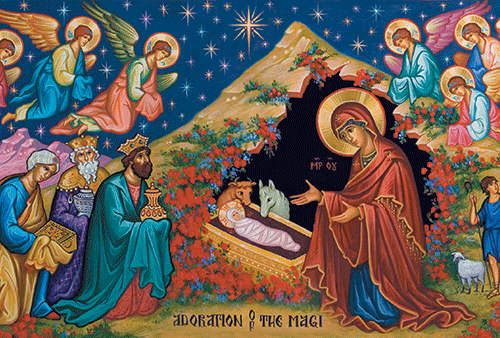Sunday (short) Homily - January 5, 2020 - Who is King?

I.
It's the twelfth day of Christmas, y'all!
So, that means that I will,
in full honesty,
still wish you a very merry Christmas.
Christmastide, as it is sometimes called,
brings with it many great traditions handed down through the years.
Like the tradition of lights on our Christmas trees,
which was a tradition that was potentially started
by the Reformer Martin Luther himself
[https://www.christianitytoday.com/history/2008/december/why-do-we-have-christmas-trees.html]
But, in local Christmas observance,
my family growing up,
and likewise my family now,
has a tradition of watching a very particular Christmas movie
in celebration of the season.
That movie is the Muppet Christmas Carol.
And it is,
in my uninformed opinion,
the best movie adaptation of Charles Dickens's A Christmas Carol ever made.
And, for as many great things there are about this movie,
there is a particularly important part of Ebenezer Scrooge's character
that is brought out excellently
by Sir Michael Caine's portrayal of this famous Christmas curmudgeon.
And it is this:
Scrooge's transformation from being a self-absorbed miser at the beginning of the movie,
(sad, suspicious, coveteous and selfish)
into the generous, compassionate, and kind man
at the end of the movie.
Scrooge, through the supernatural aid of Jacob Marley,
with the 3 Ghosts of Christmas,
is utterly transformed into a genuinely different person
through the lessons taught by the Ghosts of Christmas past,
Christmas present,
and Christmas future.
The obvious change in Scrooge is his generosity,
a penny-pinching miser,
who takes joy in evicting the poor from their houses,
transformed into a generous and joyful giver at the end of the movie.
But the more subtle, and vastly more important change
can be seen in Scrooge's change from selfishness
to selflessness.
In Scrooge's selfishness,
the way he measures his worth
is by how much money he hoards.
And, as a moneylender skilled in underhanded deeds and unforgiving in practice,
Scrooge became quite rich,
but at the expense of the health of his soul.
After all, Jacob Marley shows up to show how great an iron chain
he has forged for himself to be tormented by in the afterlife.
But in Scrooge's transformation,
he becomes highly trained in selflessness,
someone utterly aware and compassionate toward the poor and needy
because he sees them as his family.
And Scrooge as a character,
a transformed character,
stands in contrast to another character that we hear this morning,
a character that perhaps has more to teach us than we might think:
and that character is King Herod.
II.
King Herod, in today's Gospel,
has Wise Men from the East,
also called Magi,
show up in his court.
And they ask him a very extraordinary,
and terrifying question:
"Where is the child who has been born king of the Jews?
We have seen his star and have come to pay him homage."
[Matthew 2:1-3]
And King Herod,
the puppet king of the Roman Empire,
the "King of Judea"
is selfishly terrified.
He is the king,
and to have Wise Men show up en force
and speak of a promised Child born King
is not just a strange encounter:
it is a threat to his power.
His power and control were being threatened,
and he is willing to do anything to resist it.
And it is driven by his selfishness,
Herod's utter drive to get what he wants
at the expense of literally anyone,
even harmless babies.
While Scrooge's selfishness in the beginning of The Christmas Carol
results in him evicting the poor of their houses to die in the cold winter with no home
Herod's selfishness leads him to have every baby in Judea killed
in a feeble attempt to protect his pitiful claim to power.
[Matthew 2:16-18]
But the more important selfishness is this:
Herod, an earthly King, through his selfishness,
refused the Divine King that had come to save the world.
And in doing so, might have shunned the olive branch of God
given toward him in Jesus Christ, the Son of God.
Rather, Herod in his selfishness,
could not see King Jesus as anything else but a threat to his power.
And yet, in what Jesus Christ did for us,
we learn the extremely important truth
that Jesus Christ did not come to threaten you:
Jesus Christ came to save you from sin and death.
And God became human long ago
so that we could be set free and be made truly alive.
Because God showed us that selflessness is the true power
that heals the world.
And we would not know how to be selfless
without the power of Jesus Christ
who shows us what true love looks like.



Comments
Post a Comment